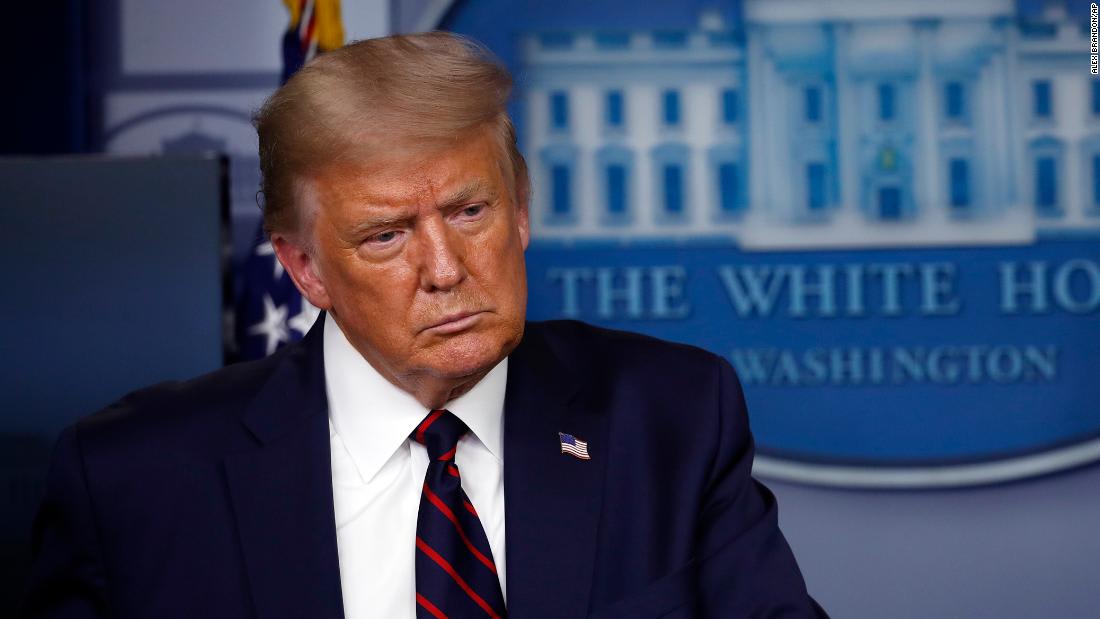Nearly 7 million US students will start the school year online
From CNN's Elizabeth Stuart
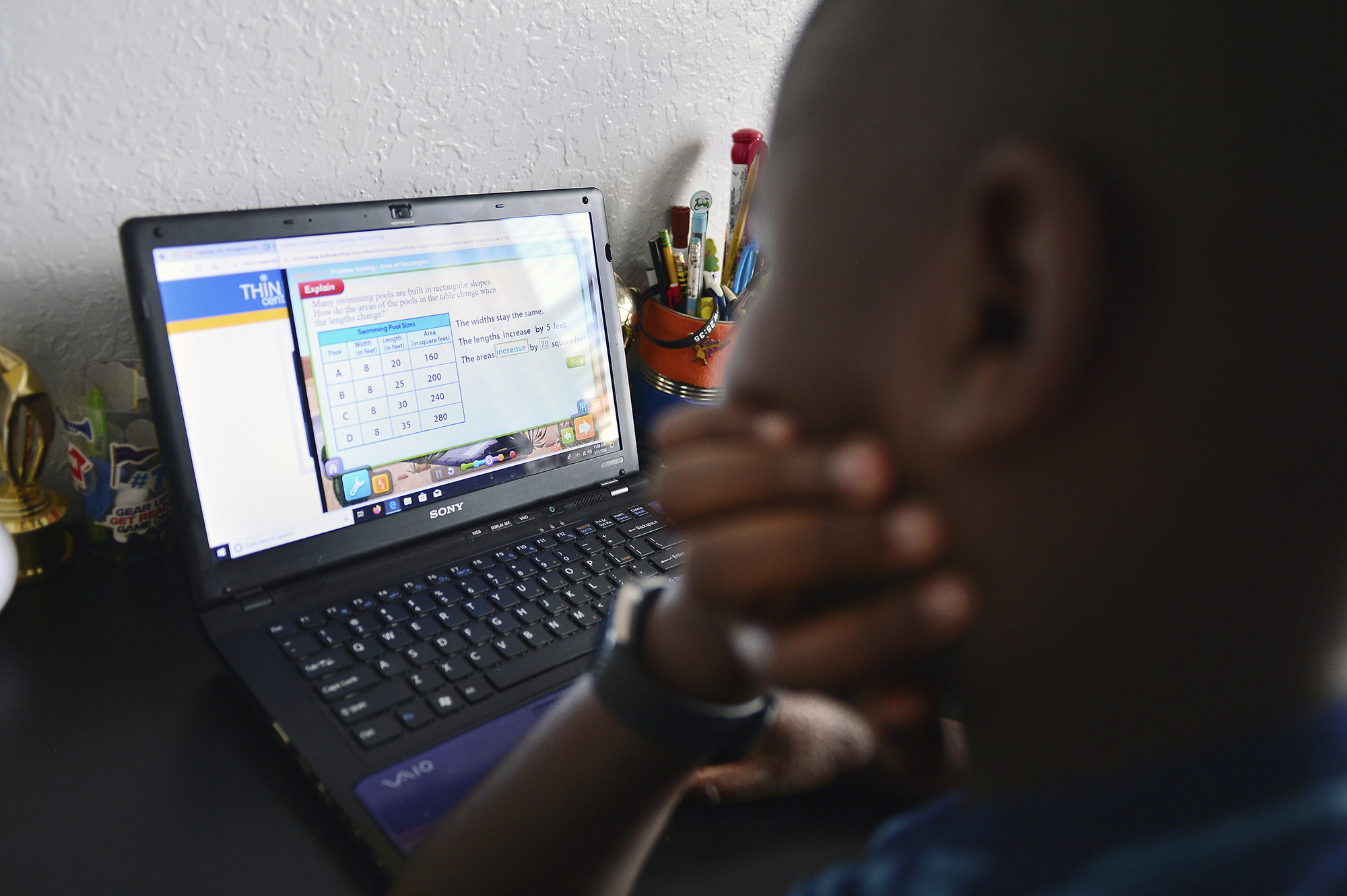 In this March 31 file photo, 9-year-old Jordan works on an online assignment after his school in Miramar, Florida, went virtual following the coronavirus outbreak in the United States. Johnny Louis/Sipa/AP
In this March 31 file photo, 9-year-old Jordan works on an online assignment after his school in Miramar, Florida, went virtual following the coronavirus outbreak in the United States. Johnny Louis/Sipa/APAs the 2020-21 school year gets underway in parts of the country, 62 of the largest 101 districts in the US will be starting with full online learning, which accounts for nearly 7 million students.
The latest decision to start the year with full remote learning came from Chicago Public Schools, the third largest district in the US.
By CNN's count, there are five districts among this top group that have yet to make a final decision, including New York City, which is the largest in the country with more than 1.1 million students.
The others are Hillsborough County, Florida; Dallas, Texas; Greenville, South Carolina; and Boston, Massachusetts.
There are more than 13,000 school districts in the US and more than 50 million children who attend public school, according to the National Center for Education Statistics.
NYC parents must choose how their kids will go back to school by tomorrow
From CNN's Theresa Waldrop
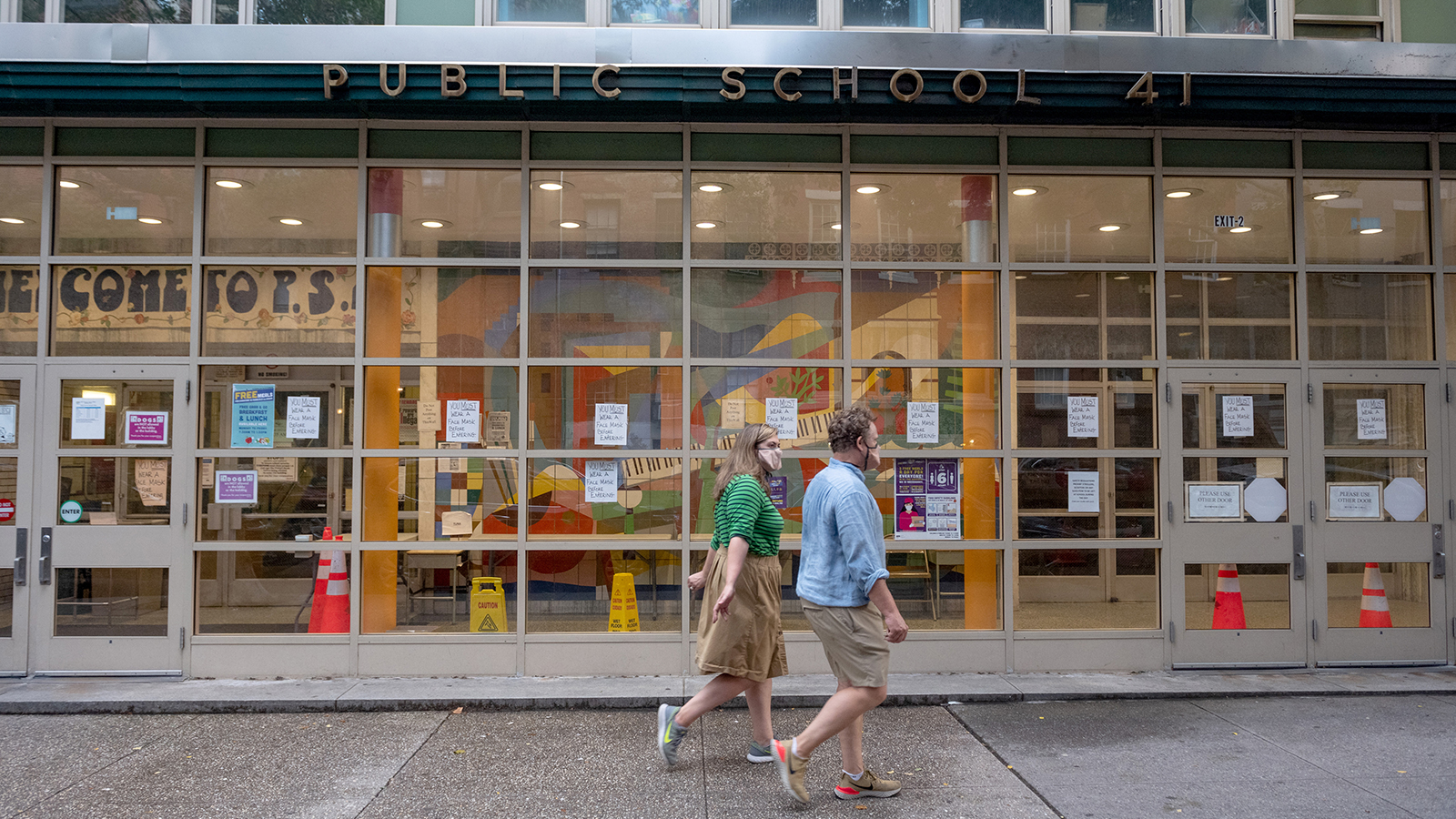 People wearing masks walk past a public school in the Greenwich Village on July 8 in New York. Alexi Rosenfeld/Getty Images
People wearing masks walk past a public school in the Greenwich Village on July 8 in New York. Alexi Rosenfeld/Getty ImagesNew York City parents must decide by tomorrow what their children's learning preference will be for the upcoming school year.
According to the city's department of education website, schools will offer a combination of in-person and remote learning.
Parents can choose from two options via an online form:
After Aug. 7, according to the website, any family who chose 100% remote learning will have the option to change back to "blended learning at a few specific times during the school year." If no form is submitted for a child, the "default for that student will be blended learning."
The form does not apply to charter schools. The website noted that if a child attends a charter school, parents should reach out to the school directly to discuss remote learning options.
Some background: New York City is the largest school district in the country, with more than 1.1 million students. City school officials have sent plans to the state for each of the city's 1,800 schools, and those still need approval, Mayor Bill de Blasio said earlier this week on CNN.
The mayor said he would not reopen schools if the city goes above a 3% Covid-19 infection rate.
"We're going to have social distancing in every classroom. We're going to have face coverings on every adult and child. We are doing everything you've ever heard of to keep our schools safe. And, again, all of our health professionals are working on that together," de Blasio said.
Gov. Andrew Cuomo said he will make an initial decision this week on the schools' reopening plans.
Read more here about what the other large US school districts are planning for reopening.
1.2 million more Americans filed for unemployment benefits last week
From CNN's Anneken Tappe
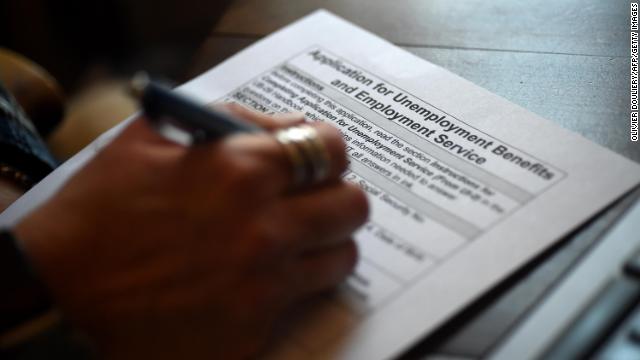
Another 1.2 million Americans filed for first-time jobless benefits last week on a seasonally adjusted basis, the Department of Labor reported on Thursday. That was down from the prior week's 1.4 million claims.
First-time jobless claims peaked at 6.9 million in the last week of March and then declined for four months. But around mid-July, they reversed directions, and rose again.
That's not a good look for a labor market that desperately needs to recover after millions of workers were displaced by the pandemic.
Rising Covid-19 infections across the country have stalled the reopening of the economy and have made it harder for people to return to work. In addition, money from the government's Paycheck Protection Program, which allowed companies to hire back workers, is running out.
Continuing claims for benefits — which count people who have applied for government aid for at least two weeks in a row — came in at 16.1 million on a seasonally adjusted basis.
And those numbers are only regular jobless benefits and don't include the pandemic assistance the government rolled out over the past months.
This Iowa teacher wrote her own obituary because she's scared of the state's reopening plan
From CNN's David Williams
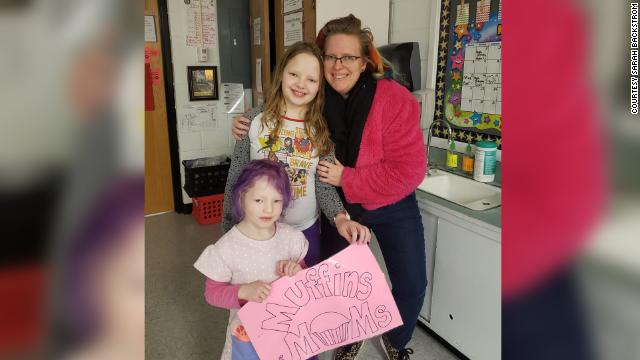 Teacher Sarah Backstrom, right, said she'd love for her daughters Josephine ten, and Vivienne, four, to have in-person classes, but doesn't think it's safe. Courtesy Sarah Backstrom
Teacher Sarah Backstrom, right, said she'd love for her daughters Josephine ten, and Vivienne, four, to have in-person classes, but doesn't think it's safe. Courtesy Sarah BackstromSarah Backstrom knew this school year was going to be different, even without the Covid-19 pandemic. The veteran teacher moved to Des Moines, Iowa, with her young daughters to teach in a new school district — but this is the first time she's been scared about returning to the classroom.
So, in addition to all her back-to-school preparations this summer, Backstrom wrote her own obituary and sent it to Gov. Kim Reynolds' office.
In her obituary, which she provided to CNN, she wrote, "Sarah loved her friends and family with her whole heart. She had a laugh that was infectious and could always be counted on for an off-hand remark or a joke. She was known for finding sunshine even in the darkest of times."
Backstrom, 43, said that she was known for her "rainbow hair and eccentric fashion sense," and urged her friends and loved ones to wear leopard print, funny T-shirts and rainbow wigs to celebrate her life.
She will be teaching gifted students at three elementary schools, and recently found out that her work will be 100% virtual to minimize the risk of her tracking the coronavirus from building to building.
Backstrom said she loves being in the classroom and is sad that she won't be able to greet her students with hugs and enjoy the back-to-school rituals that are so important to children.
"There's really nothing that can take the place of face-to-face talking with a student," she said. "There's something really magical that happens in a classroom when you're all in this space and kind of sharing energy."
She and her ex-husband also have two daughters going into preschool and fifth grade, so she knows firsthand how tough home schooling is on parents.
"More than anything, I want to be in the classroom, and I want to be in my schools, but I also don't want to get sick and I don't want my mom to get sick," she said.
Some background: Gov. Reynolds released guidance July 30 that said at least half of schools' instruction must be conducted in person and that schools couldn't request online-only education unless their county's positivity rate is 15% or higher.
Iowa has reported 46,656 cases across the state and a 9.4% positivity rate as of Tuesday, according to the Iowa Department of Health.
Backstrom said she was inspired to write after reading an article about Sioux City teacher Jeremy Dumkrieger, who published his own obituary in the Iowa Starting Line website.
"It's up to us" to get Covid-19 cases down by election day, Fauci says
From CNN's Health Gisela Crespo
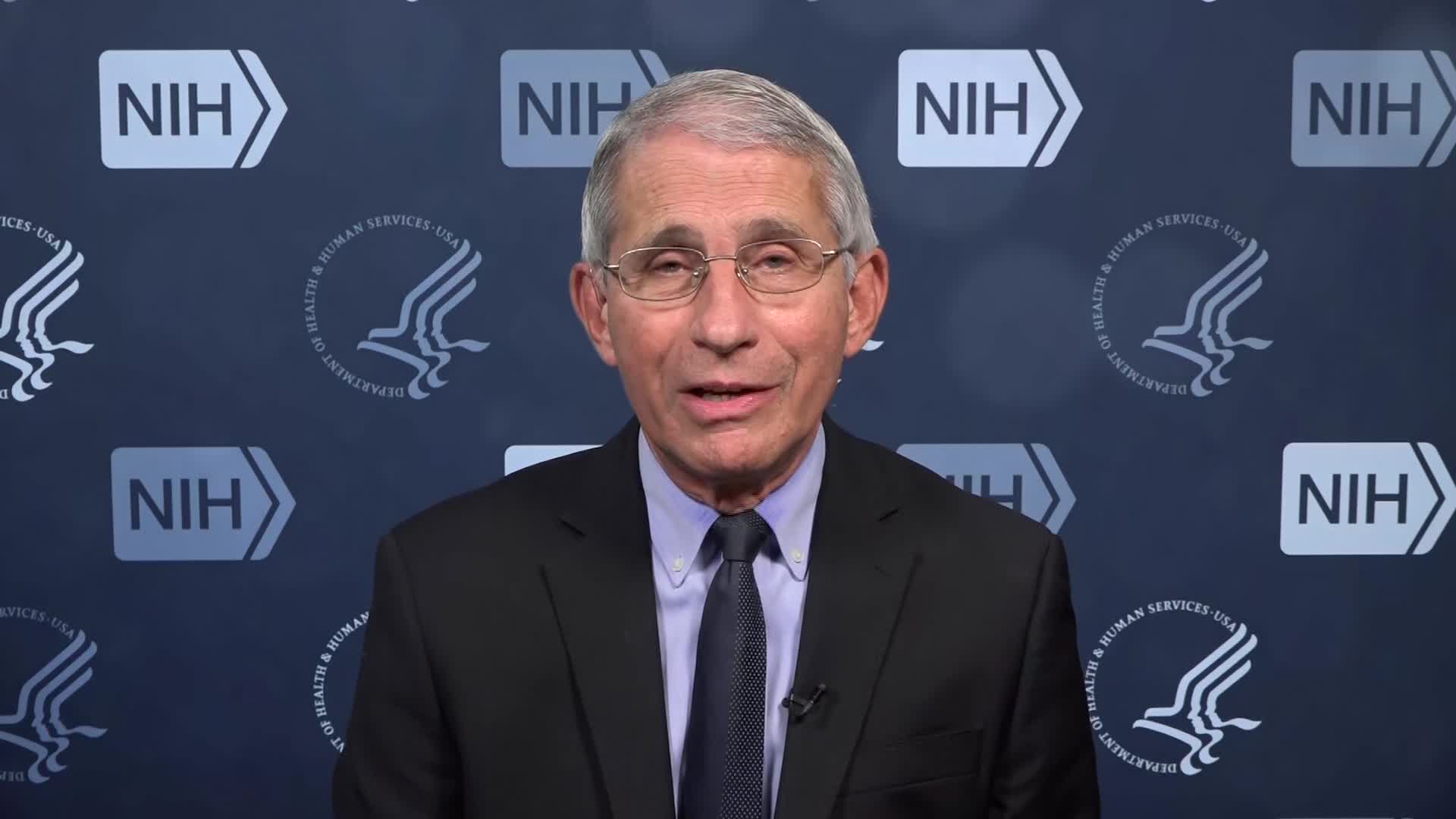 CNN
CNN"It's up to us" to get the number of new Covid-19 cases down by November, when the country holds the presidential election, said Dr. Anthony Fauci, director of the National Institute of Allergy and Infectious Diseases, during an interview on CNN's New Day Thursday.
"It isn't inevitable that we need to be way up there as we get towards [the] election. ... Everyone, all states, cities have to pull together for that," Fauci told CNN's John Berman.
WATCH:
At least 53 hospital ICUs have reached capacity in Florida
From CNN’s Rosa Flores and Sara Weisfeldt
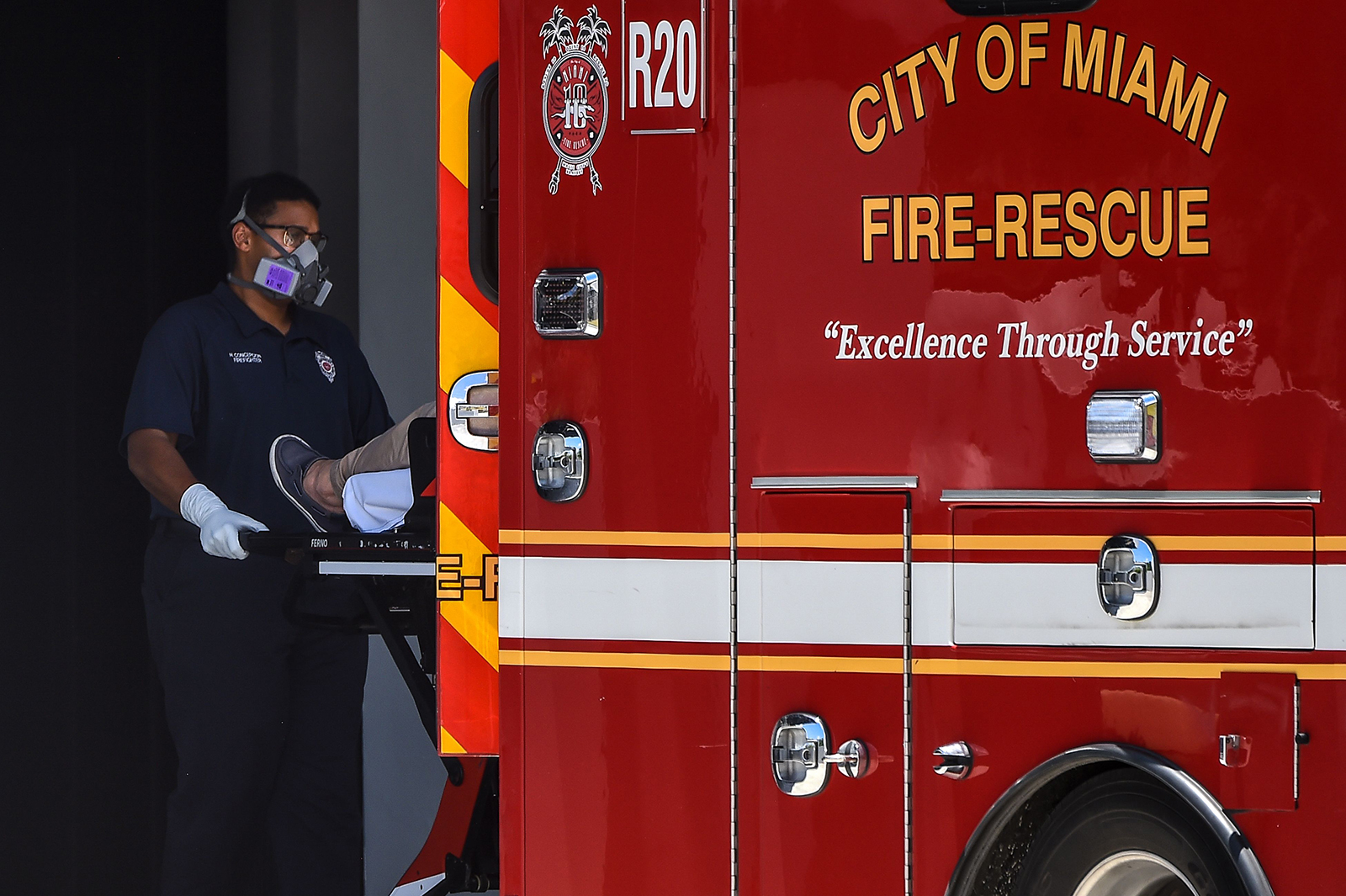 A medic transfers a patient on a stretcher from an ambulance outside of Coral Gables Hospital near Miami on July 30. Chanda Khanna/AFP/Getty Images
A medic transfers a patient on a stretcher from an ambulance outside of Coral Gables Hospital near Miami on July 30. Chanda Khanna/AFP/Getty ImagesIn Florida, at least 53 hospitals have reached intensive care unit capacity and show zero ICU beds available, according to data released by the Agency for Health Care Administration (AHCA).
Eight of the hospitals at capacity are in Miami-Dade County, eight are in Hillsborough and six of them are in Broward County, AHCA data shows.
Another 33 hospitals have 10% or less ICU capacity available, according to AHCA.
AHCA reports about 15% ICU beds are available across the State of Florida.
Fauci: “Everybody on the team of American citizens need to pull together”
From CNN's Adrienne Vogt
Dr. Anthony Fauci, director of the National Institute of Allergy and Infectious Diseases, warned against people who feel “invulnerable” to getting the coronavirus.
“By getting infected, you are propagating the outbreak,” Fauci said on CNN’s “New Day,” and thus potentially infecting people who could be seriously impacted by the virus.
Yesterday, Fauci told CNN’s Dr. Sanjay Gupta that if the US does not have a unified response against Covid-19, the country is at risk of continuing to "smolder."
Dr. Deborah Birx, White House coronavirus task force coordinator, outlined new areas of concern in nine US cities and California’s Central Valley on Wednesday.
“It’s a clear indication that you are getting an uptick in cases, which inevitably, as we've seen in the Southern states, leads to surges and then you get hospitalizations and then you get deaths,” Fauci said. “… She was warning the states and the cities to be careful, because this is a predictor of trouble ahead.”
Fauci said that communities and economies can “carefully proceed” on reopening, as long as people follow guidelines on wearing masks and social distancing to do so safely.
When asked where he sees the pandemic’s status by the time of the presidential election, Fauci said “it’s up to us.”
“If we pay attention to the fundamental tenants of infection control and diminution of transmission, we could be way down in November,” he said.
Watch:
Beirut’s hospitals were already buckling. Then the explosion hit.
From CNN’s Tamara Qiblawi in London, Jomana Karadsheh in Istanbul and Mostafa Salem in Abu Dhabi
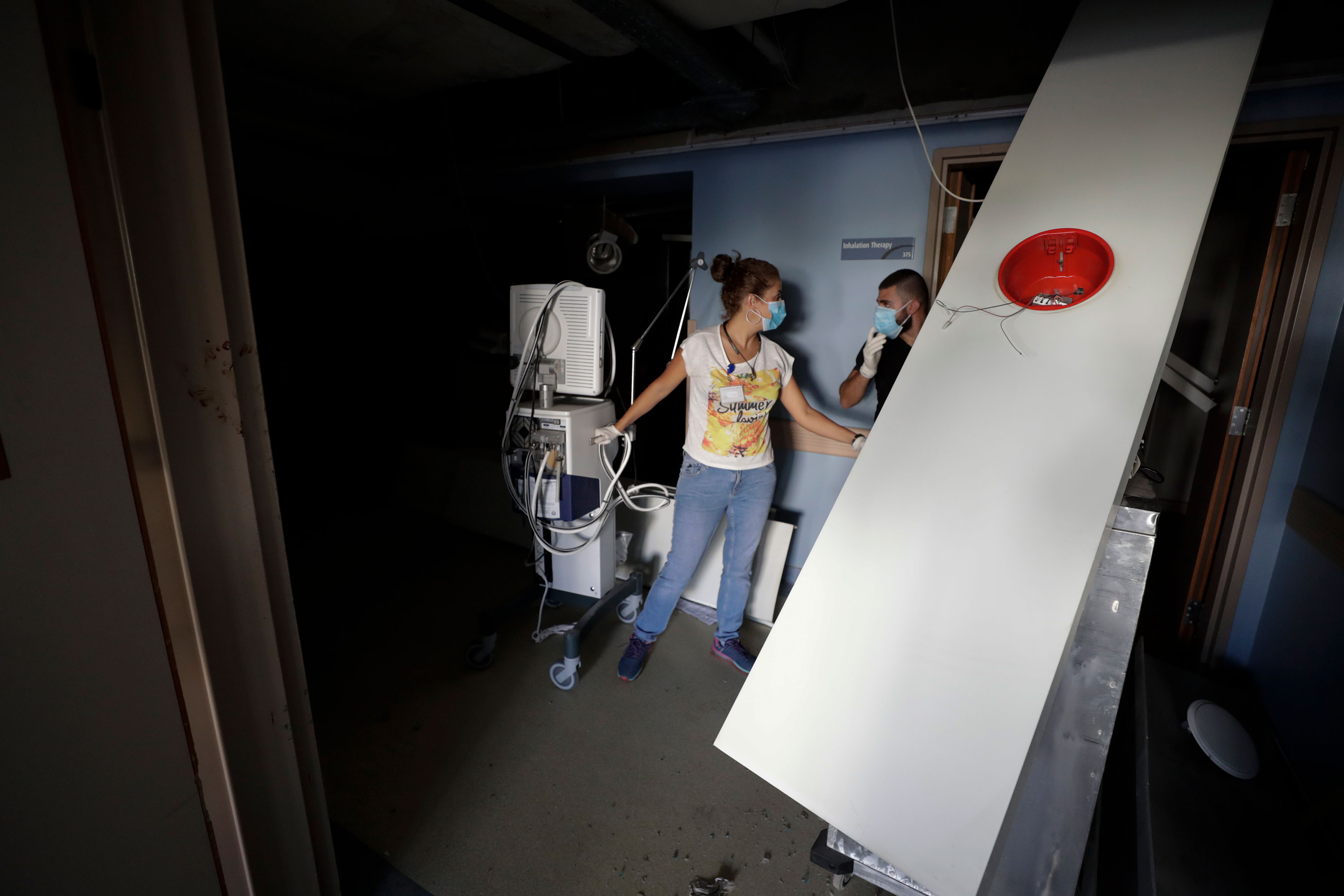 People work at a damaged hospital after the explosion in Beirut. Hassan Ammar/AP
People work at a damaged hospital after the explosion in Beirut. Hassan Ammar/APOn Tuesday morning, the head of Beirut’s main public hospital treating coronavirus patients said his facilities would soon reach full capacity after a surge in the country’s Covid-19 cases. It was a statement that seemed to foretell the worst case scenario for Lebanon’s healthcare system, already buckling under the weight of an economic meltdown.
Hours after the announcement, a massive explosion ripped through Lebanon's capital and its outskirts, devastating broad swathes of the city and killing more than 130 people.
Thousands flooded the hospitals, many of which were also damaged. Patients lay on the floor as they were administered IV-drips. The cries of babies bounced off the walls. One US citizen in Beirut told CNN that he visited the St George Hospital offering to donate blood. The security guard turned him away. "We don’t need blood, because there is no hospital. We are zero," said the guard.
For now, the health ministry has said that field hospitals will be set up to treat the over 5,000 wounded, and sections will be designated for coronavirus patients. But where and how, amid this devastation, Lebanon can tackle its growing Covid-19 spread is anyone’s guess
On Thursday, Lebanon’s Health Minister Hamad Hassan told radio station Sawt Loubnan that the country was bracing for a rise in infections, state news agency NNA reported.
Due to the emergency and panic, I am worried that treating the wounded in hospitals and the loss of personal protection equipment supplies may have an impact on the number of coronavirus patients in the next 10 days," he said.
Lebanon recorded 146 new cases on Wednesday, and 209 on Tuesday, according to an official statement by the Health Ministry on Twitter.
The country has seen a total of 5,417 coronavirus cases and 68 deaths so far, according to data from Johns Hopkins University.
Trump singles out Texas and Florida for help with coronavirus response
From CNN's Priscilla Alvarez, Jeremy Diamond and Ryan Browne
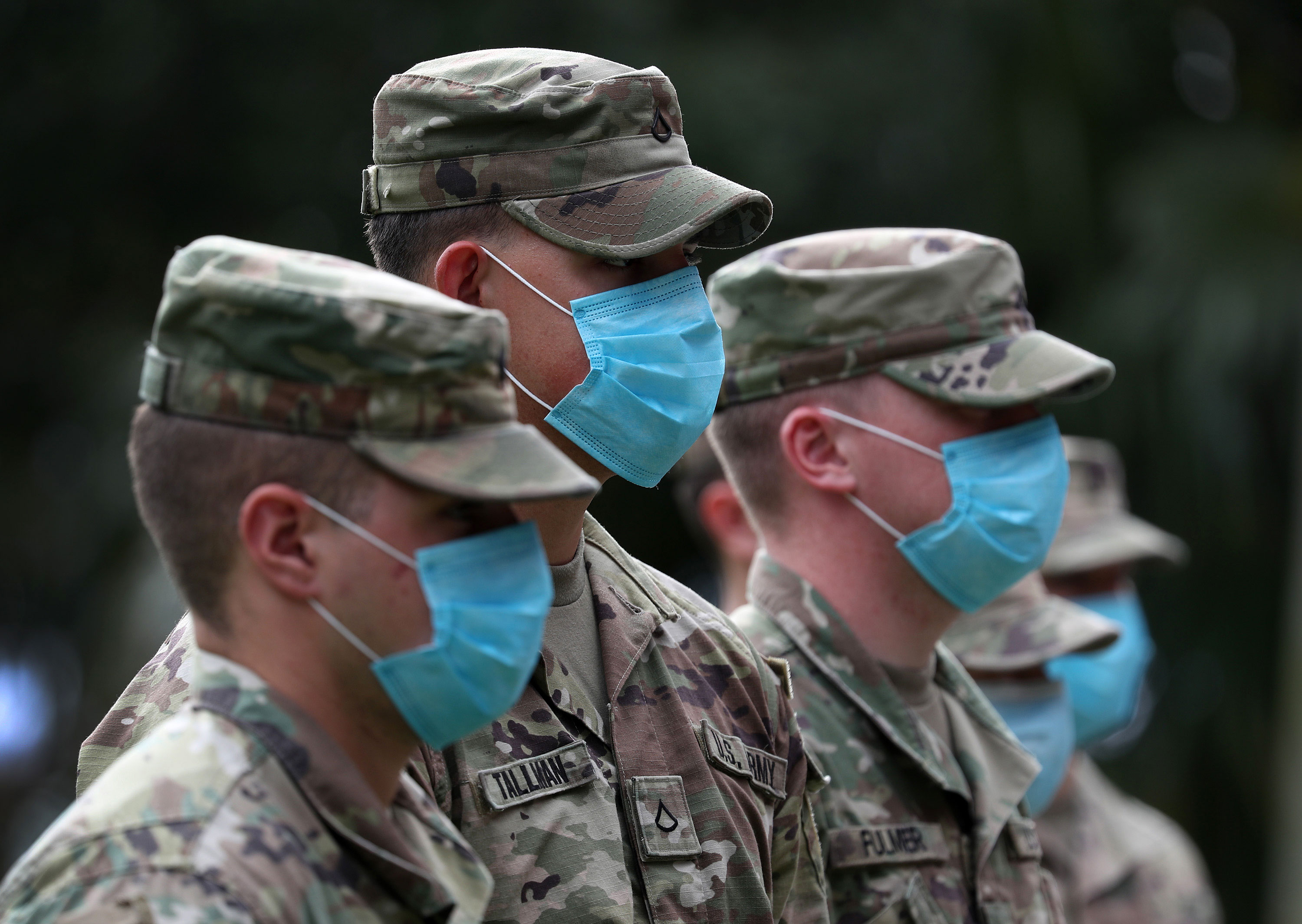 Florida National Guard members at a press conference on April 17 in Fort Lauderdale, Florida. Joe Raedle/Getty Images
Florida National Guard members at a press conference on April 17 in Fort Lauderdale, Florida. Joe Raedle/Getty ImagesPresident Donald Trump agreed to continue paying for the full cost of National Guard troops deployed to help with the coronavirus response in just two states -- Texas and Florida -- after their Republican governors appealed directly to him.
Other states will now have to pay a quarter of the cost of National Guard deployments in their states, despite their governors also requesting the federal government continue to foot the entire bill. A White House official said Trump made an exception for Texas and Florida because their governors -- who enjoy close relationships with Trump -- made "special, direct cases to the President."
The official said Trump "is open to speaking with any governor from any state."
While Texas and Florida both have a large number of coronavirus cases -- more than 466,000 and 502,000, respectively -- other states with large numbers of cases, like California and Arizona, will only see three-quarters of the costs covered by the federal government.
Democrats immediately pushed back, accusing the President of showing favoritism.
With American lives at risk, the President is continuing to manipulate our nation's pandemic response to benefit his own political fortunes," said Noam Lee, executive director of the Democratic Governors Association, in a statement. "The National Guard deployments are the latest development in the partisan games the President has played with states seeking critical supplies and aid."
Read more here:

 5 years ago
550
5 years ago
550 